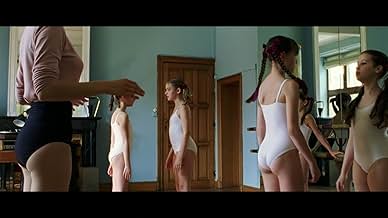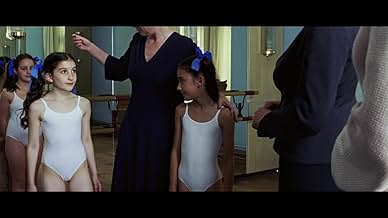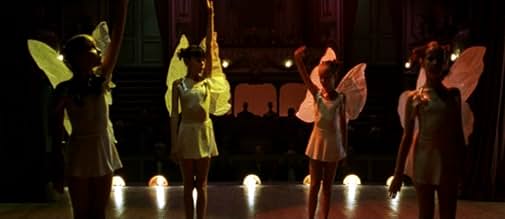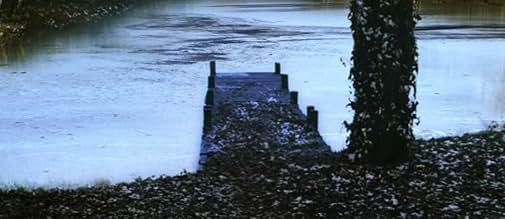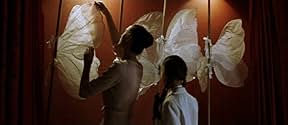AVALIAÇÃO DA IMDb
6,8/10
6,7 mil
SUA AVALIAÇÃO
Uma olhada no interior de um internato incomum para meninas.Uma olhada no interior de um internato incomum para meninas.Uma olhada no interior de um internato incomum para meninas.
- Direção
- Roteiristas
- Artistas
- Prêmios
- 8 vitórias e 2 indicações no total
- Direção
- Roteiristas
- Elenco e equipe completos
- Produção, bilheteria e muito mais no IMDbPro
Avaliações em destaque
There can't be many films that occupy your mind for many days afterwards, make you read the book they are based on, and then watch them again.
"Innocence" is one of those films and it is both beautiful and intriguing at the same time. It is based on a book by Frank Wedekind called "Mine-Haha or the corporeal education of girls", the only published fragment of his unfinished novel "Hildalla". It was first published in 1901 and although beautifully written it has much darker undertones than the film with references to a body cult of youth and natural beauty which would later become exploited by Nazi culture.
The film is very much a metaphor for a childhood world which is in many ways separate but also protected from that of adults. It plays in an isolated Girls School their children enter at the time when they start to make their own independent experiences of the world around them and ends with the onset of puberty and attainment of menarche, both symbolising the emotional and physical end of childhood. The cinematography is beautiful and reminded me in many ways of Tarkovsky with its symbolism and haunting images. However, the story can seem a little simplistic and linear times and often appears to demand more depth from the young child actors than they could possibly deliver.
Nevertheless this is a very interesting and thought-provoking film and well worth watching. The French dialogue often has a musical quality and as long as you're prepared to watch this in a calm and unhurried state of mind this is very rewarding and unusual cinematic experience.
"Innocence" is one of those films and it is both beautiful and intriguing at the same time. It is based on a book by Frank Wedekind called "Mine-Haha or the corporeal education of girls", the only published fragment of his unfinished novel "Hildalla". It was first published in 1901 and although beautifully written it has much darker undertones than the film with references to a body cult of youth and natural beauty which would later become exploited by Nazi culture.
The film is very much a metaphor for a childhood world which is in many ways separate but also protected from that of adults. It plays in an isolated Girls School their children enter at the time when they start to make their own independent experiences of the world around them and ends with the onset of puberty and attainment of menarche, both symbolising the emotional and physical end of childhood. The cinematography is beautiful and reminded me in many ways of Tarkovsky with its symbolism and haunting images. However, the story can seem a little simplistic and linear times and often appears to demand more depth from the young child actors than they could possibly deliver.
Nevertheless this is a very interesting and thought-provoking film and well worth watching. The French dialogue often has a musical quality and as long as you're prepared to watch this in a calm and unhurried state of mind this is very rewarding and unusual cinematic experience.
The final title, "for Gaspar" (Noe, director of IRREVERSIBLE), hints at the pedigree of the makers of this quite fascinating study of young girls on the cusp of adolescence.
Benoit Debie, the cinematographer of IRREVERSIBLE, shot the film.
Six year old Iris (Zoe Auclair) arrives at her new country school in a coffin. She becomes infatuated with twelve-year-old Bianca (Berangare Haubruge) who disappears each evening and returns in the morning. The girls spend most of their days studying ballet and preparing for an important exam.
The school is like a keep. The girls are encouraged to find happiness in obedience. Parents never visit. The world beyond its tall hedges exists like something within a dream.
Director Lucile Hadzihalilovic imbues every aspect of the film with a dreamy, meditative veneer. Shots of the pre-teen nymphs dancing, cartwheeling and splashing about in shallow water recall the grainy erotic imagery of David Hamilton's early feature films -- in particular, LAURA and BILITIS. The ballet sequences and striking compositions of solitary female figures in towering external landscapes owe a small debt to Dario Argento's SUSPIRIA and, to a lesser extent, his PHENOMENA. But this is not a deliberate softcore meditation on childhood sexuality. It is a metaphorical examination of how innocence is ruptured by its own curiosity.
The camera angles stress the importance and prominence of legs to a fetishistic degree. This focus is an organic extension of the girls' ballet training; a darker purpose for legs is indicated later in a chilling line of dialogue. Debie's cinematography emphasizes light and shade and is never pretty for its own sake.
The forest filled with lamps has a deliciously surreal, fairytale quality. The sequences where the girls dance for a faceless audience reminded me of one of MULHOLLAND DRIVE's most haunting sequences. The film's sound design also echoes the internal voids of the Lynchian world.
The film is not big on explanations and is a touch too slow at times, but it presents a thoroughly realized universe that is a stark metaphor for life's discoveries and disappointments. The performances possess perfect pitch and the tone remains both haunting and consistent.
What exactly is the film about? The girls may be in a purgatory of sorts, a resting place between life and death. Perhaps not. Perhaps they are in a holding pattern between childhood (innocence) and adulthood (a state requiring some loss of innocence), and when they manage to escape (succumbing to their pre-adolescent curiosity), they have forfeited their place in childhood forever. But only perhaps.
Benoit Debie, the cinematographer of IRREVERSIBLE, shot the film.
Six year old Iris (Zoe Auclair) arrives at her new country school in a coffin. She becomes infatuated with twelve-year-old Bianca (Berangare Haubruge) who disappears each evening and returns in the morning. The girls spend most of their days studying ballet and preparing for an important exam.
The school is like a keep. The girls are encouraged to find happiness in obedience. Parents never visit. The world beyond its tall hedges exists like something within a dream.
Director Lucile Hadzihalilovic imbues every aspect of the film with a dreamy, meditative veneer. Shots of the pre-teen nymphs dancing, cartwheeling and splashing about in shallow water recall the grainy erotic imagery of David Hamilton's early feature films -- in particular, LAURA and BILITIS. The ballet sequences and striking compositions of solitary female figures in towering external landscapes owe a small debt to Dario Argento's SUSPIRIA and, to a lesser extent, his PHENOMENA. But this is not a deliberate softcore meditation on childhood sexuality. It is a metaphorical examination of how innocence is ruptured by its own curiosity.
The camera angles stress the importance and prominence of legs to a fetishistic degree. This focus is an organic extension of the girls' ballet training; a darker purpose for legs is indicated later in a chilling line of dialogue. Debie's cinematography emphasizes light and shade and is never pretty for its own sake.
The forest filled with lamps has a deliciously surreal, fairytale quality. The sequences where the girls dance for a faceless audience reminded me of one of MULHOLLAND DRIVE's most haunting sequences. The film's sound design also echoes the internal voids of the Lynchian world.
The film is not big on explanations and is a touch too slow at times, but it presents a thoroughly realized universe that is a stark metaphor for life's discoveries and disappointments. The performances possess perfect pitch and the tone remains both haunting and consistent.
What exactly is the film about? The girls may be in a purgatory of sorts, a resting place between life and death. Perhaps not. Perhaps they are in a holding pattern between childhood (innocence) and adulthood (a state requiring some loss of innocence), and when they manage to escape (succumbing to their pre-adolescent curiosity), they have forfeited their place in childhood forever. But only perhaps.
I walked out of this film being the only one of a group of 5 with any clasp of what it was about. That in itself may say something about my own innocence. Many reviews of this film seem to shout 'Paedophiles!' at the reader, to me this is an interesting reaction to a film, with near fairy tale qualities, which explores themes of innocence,childhood and how our own curiosity can destroy these. Every theme in this seemingly idyllic (and beautifully captured) girls school will represent a reason for one viewers loss of innocence, and when the film drags in places I do wonder if this intentionally mirrors a child's own impatience to 'grow up'. Perhaps it is the viewers lack of innocence that adds to the films underlying eeriness..........or perhaps its that rumbling noise?
Offbeat? This film is so far removed from offbeat, that previous films described as offbeat are marching in military step unison. Innocence is a gorgeous composition of thought, sound and beauty which is utterly compelling to watch but challenges the viewing audience to a hard fought internal battle, raising questions within the viewer, in a William Blake-ish "Songs Of Innocence, Songs Of Experience" manner.
Undoubtedly the cinematography is some of the most striking that has been put to film certainly this side of the millennium, as Hadzihalilovic manages to compose wonderful shots of serene beauty within a hidden sense of malice and darkness. His symbolic use of colours is highly key to the understanding of the events, themes and emotions and aids the viewer immensely in being able to 'try' (and I emphasis the word) and dissect the layers of thought provoking connotations on the nature of innocence.
It's not always the most comfortable film to be viewing, as certain IMDb reviewers would hasten to claim it has "pedophilic tendencies", but I fear they're somewhat missing the point of the entire film; yes it is often at times difficult to view, but there is a purpose. William Blakes collection of poems on innocence and experience charts the replacing of the former with the latter. He shows us how innocence cannot be appreciated til you are experienced, but how experience completely taints any notion of innocence, and the same is with this precise film. These unsettling moments for us are only so because of the experience which we possess and have learnt throughout our existence, to the girls they don't see the same sins, pitfalls and traps we do, to them they are merely acting on instinct, as children do, in an innocent, cares- of the world-free way.
Thus the film charts the fall of innocence from the elder girls at the hauntingly constructed boarding school, and the continuing of the cycle through metamorphic symbolism, the circle of young life. Although it does make me question the use of the word "film". If I had but one criticism of the film, for all its mesmerising viewing and original premise it comes across more as a case study in innocence rather than a fully fledged story. While undeniably engaging and engrossing it lacks a certain spark, becoming more concerned with the ideas than the progression of any one story, to the extent where the ideas will be ringing in your head for days afterwards, but lacking a sense of resolution. Innocence would be an impressive debut solely on the basis of bravery alone for tackling such a notion, and so effectively, but the hallmarking of this 'case study' comes in the directors striking use of colours, symbolism and cinematography which I personally believe to have been unsurpassed in the films I've seen of recent years. Although you have been warned, the film is an intense experience which will not set well with everyone, but given that you have now been warned, so it's not as if you can claim you were innocent of that.
Undoubtedly the cinematography is some of the most striking that has been put to film certainly this side of the millennium, as Hadzihalilovic manages to compose wonderful shots of serene beauty within a hidden sense of malice and darkness. His symbolic use of colours is highly key to the understanding of the events, themes and emotions and aids the viewer immensely in being able to 'try' (and I emphasis the word) and dissect the layers of thought provoking connotations on the nature of innocence.
It's not always the most comfortable film to be viewing, as certain IMDb reviewers would hasten to claim it has "pedophilic tendencies", but I fear they're somewhat missing the point of the entire film; yes it is often at times difficult to view, but there is a purpose. William Blakes collection of poems on innocence and experience charts the replacing of the former with the latter. He shows us how innocence cannot be appreciated til you are experienced, but how experience completely taints any notion of innocence, and the same is with this precise film. These unsettling moments for us are only so because of the experience which we possess and have learnt throughout our existence, to the girls they don't see the same sins, pitfalls and traps we do, to them they are merely acting on instinct, as children do, in an innocent, cares- of the world-free way.
Thus the film charts the fall of innocence from the elder girls at the hauntingly constructed boarding school, and the continuing of the cycle through metamorphic symbolism, the circle of young life. Although it does make me question the use of the word "film". If I had but one criticism of the film, for all its mesmerising viewing and original premise it comes across more as a case study in innocence rather than a fully fledged story. While undeniably engaging and engrossing it lacks a certain spark, becoming more concerned with the ideas than the progression of any one story, to the extent where the ideas will be ringing in your head for days afterwards, but lacking a sense of resolution. Innocence would be an impressive debut solely on the basis of bravery alone for tackling such a notion, and so effectively, but the hallmarking of this 'case study' comes in the directors striking use of colours, symbolism and cinematography which I personally believe to have been unsurpassed in the films I've seen of recent years. Although you have been warned, the film is an intense experience which will not set well with everyone, but given that you have now been warned, so it's not as if you can claim you were innocent of that.
Amazing. Not for all tastes, to be sure, but infinitely intriguing and accomplished. Great movie. After all the previous not totally successful, or barely watchable or downright awful fantasy movies that have come out of France in the last five years or so, French cinema turns out to be capable of producing an intelligent, beautiful, original work of art with its roots in the fantasy field which is both a treat to the eye and intelligence, and a graphically arresting piece of movie making. The film, dealing with strange ongoings at a remote boarding school for young girls in a mystery-ridden forest somewhere, is incredibly catching, full of hypnotic images. It is indeed closer to the spirit of silent movies, in particular the German school of Fritz Lang, Murnau, Pabst, etc, than to most modern movies. But so brilliant and respectful in its approach that it soon makes you forget its origins. The are dreamlike visions by the dozen in Innocence, superior or equal to Lynch's best films, to Jackson's Heavenly Creatures, or to Jane Campion's cinema in its finer moments, for instance. A painter in terms of framing and composition, the director is always lifting the material up into poetry country. See it and you will not be left untouched. Few films ever reach that kind of weirdness and movie magic. It has no comparison. Really.
Você sabia?
- CuriosidadesIn the 'extras' on the DVD release, the director relates that children playing unsupervised in nature (the forest, the pond) is a 'freeing' setting for them, an 'uncontrolled' environment to explore. Water is very important, as it is a highly visible medium in its many forms (including within or from underneath a surface), and it is necessary, sensual, and enjoyable, but also dangerous (the drowning), and evokes many emotions. Flowing water can also symbolize the passage of time. The dynamic of children relating to adults, not understating them or their actions, while seeing them as role models, is another dichotomy the director wanted to emphasize. Ambiguity and a 'dream-like' quality are also important elements of the film. She states they digitally enhanced or 'tweaked' colors in the film to 'non-realistic' tones, to achieve mood and lighting effect, particularly day for night shots. The director says she is not interested in explaining meaning: "... what I like in cinema is being lost. I like films I don't completely understand, so they stay with me longer after they're over," and, "I believe everyone can find their own stories within the film."
- Erros de gravaçãoWhen Bianca says goodbye to all the girls there is snow in the alley and they are all outside dressed with bare arms and bare legs. Then Bianca runs away in pouring rain. No more snow on the ground.
- Cenas durante ou pós-créditosThe entire set of credits is shown at the opening of the movie.
- ConexõesFeatured in Women Make Film: A New Road Movie Through Cinema (2018)
- Trilhas sonorasOrchestral Suite from La Petite Renard Rusée
Composed by Leos Janácek
Libretto by Rudolf Tesnohlídek
Performed by Czech Philharmonic (as The Czech Philharmonic)
Conducted by Vaclav Talich
Principais escolhas
Faça login para avaliar e ver a lista de recomendações personalizadas
- How long is Innocence?Fornecido pela Alexa
Detalhes
- Data de lançamento
- Países de origem
- Idioma
- Também conhecido como
- Innocence
- Locações de filme
- Parc du Cinquantenaire, Bruxelas, Bélgica(walking to new school)
- Empresas de produção
- Consulte mais créditos da empresa na IMDbPro
- Tempo de duração2 horas 2 minutos
- Cor
- Mixagem de som
- Proporção
- 2.35 : 1
Contribua para esta página
Sugerir uma alteração ou adicionar conteúdo ausente



